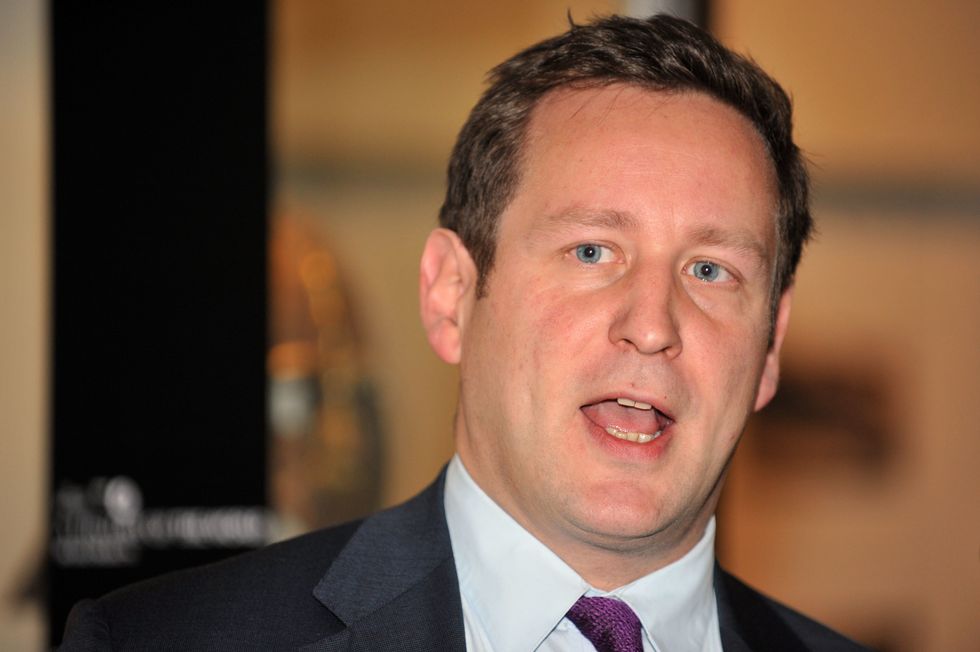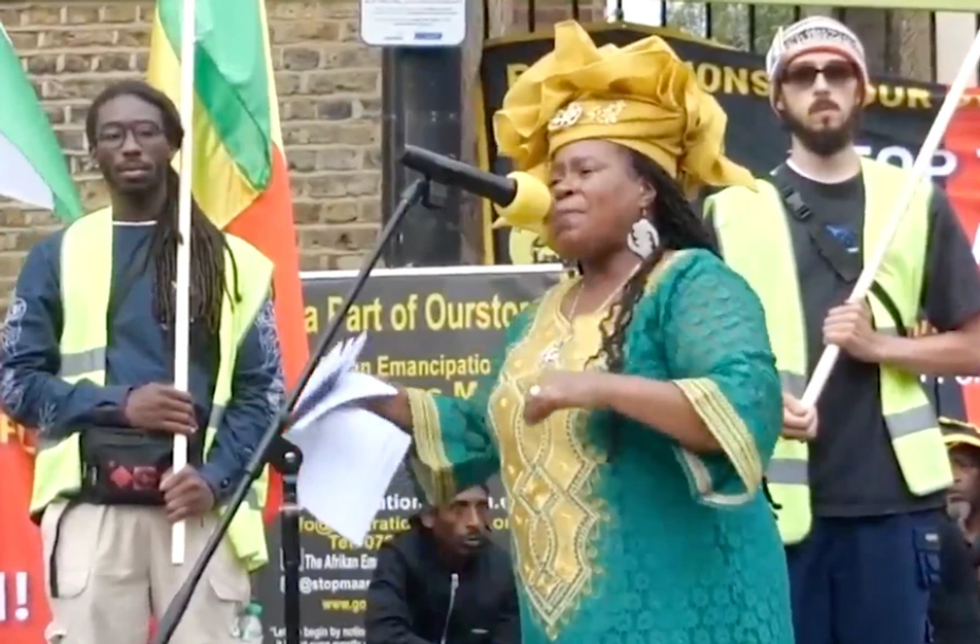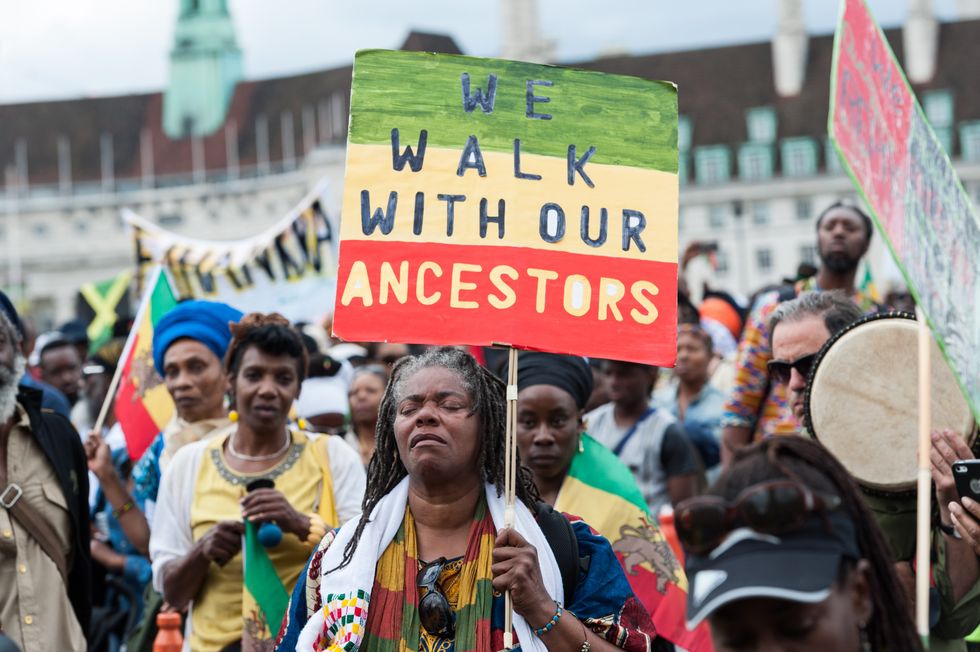Ed Vaizey was branded "unhelpful" for joining the APPG as the sole Tory member
Don't Miss
Most Read
Trending on GB News
A Tory peer has been urged to withdraw from a controversial parliamentary group after it hosted a conference that included a politician from a party that is linked with calls for racist violence.
Lord Ed Vaizey, a former culture minister, is the sole Tory member of the APPG on Afrikan Reparations, which is supported by a controversial activist who previously said that Black Lives Matter was being funded to distract people as part of an “agenda” involving the CIA, MI5 and MI6.
The APPG’s annual conference last month featured Labour MPs and other speakers, including an activist for the South African EFF party, which has been linked to pro-violence and anti-white racist rhetoric.
Diane Abbott gave a speech at the conference, introducing herself “as the descendant of slaves.”

Lord Ed Vaizey, a former culture minister, is the sole Tory member of the APPG on Afrikan Reparations
PA
She said: “Reparations isn’t about the past, it’s about the here and now.”
The Labour MP added: “Britain’s wealth and power was built on the proceeds of slavery … we are going to make them acknowledge that.”
Another speaker, Onyekachi Wambu, praised London Mayor Sadiq Khan for “finally” putting together a memorial for slavery and what he described as “the transatlantic holocaust.”
But more controversial voices followed after a speech by Bell Ribeiro-Addy, a Labour MP and chair of the APPG who has made demands for reparations in the commons.
Dr Sahidi Bilan, from the University of Sunderland in London, appeared to praise the actions of a military coup in Africa that expelled Nato forces.
Earlier this year, the three countries in the Sahel where military forces launched coups — Mali, Burkina Faso, and Niger — withdrew from the Western-backed Economic Community of West African States (ECOWAS).
Dr Bilan said “unity is power,” and appeared to praise the decisions by those who led the coups when he said: “They were able to drive out France and NATO out of all the Sahel countries.”
Esther Xosei, the general coordinator of campaign group Stop The Maangamizi, co-secretariat of the APPG, appeared to slam the rule of law in her speech, describing Britain’s laws as the “enslavers’ and colonisers’ visions of law.”
She said: “We had to restore our people’s law as African people and the two systems are there already in operation.”
Xosei did not respond to requests for clarification on these remarks.
Xosei, who has engaged in conspiracy theories about foreign intelligence services, added: “We have to contend with state capture, movement capture and elite capture. I’m saying this because many of our forebears were assassinated for this cause.”
Xosei’s “leadership” was praised by a panel, with Bell Ribeiro-Addy clapping for her and later thanking “sister Esther.”
Filmmaker Kwame Kwei-Armah OBE gave a speech about people engaging more with African-heritage culture, particularly on streaming platforms such as Netflix.
He lamented how many films have been made about Queen Victoria and Winston Churchill, with an audience member shouting “racist” when the wartime prime minister was mentioned.
The conference also heard from a former MP from the Economic Freedom Fighters, Piaba Madokwe.
LATEST DEVELOPMENTS:

Esther Stanford-Xosei helped to set up Parliament's All-Party Parliamentary Group on reparations
The EFF is a communist and black nationalist party, with Madokwe being involved at a senior level first as a student politician from 2015.
The controversial party has a long list of its members making anti-white and pro-violence statements.
In 2016, the party faced criticism after its leader Julius Malema said: "We are not calling for the slaughter of white people, at least for now."
In the same year, an EFF councillor was blocked from the local elections after a post on social media that called for the hacking and killing of white South Africans.
In 2018, leader Malema told supporters to “go after a white man” in reference to a white politician, adding: “We are cutting the throat of whiteness.”
The EFF argued that the “throat of whiteness” language was not a reference in favour of harm to whites but “a metaphorical reference to destroying white privilege.”
In 2019, Malema tweeted: “The only white man you can trust is a dead white man.”
As a result of his comments, he has been accused of “attention-seeking behaviour” that was “aimed at creating racial tension” by South African Jewish groups.
According to her LinkedIn profile, Madokwe was the EFF’s Media Liaison Officer for the Western Cape province during the period when Malema made some of his most controversial remarks.
She said that she “crafted press releases and helped organise media events to promote the organisation's image.”
Madokwe told the conference that the EU needed to prove they were not “colonisers” with regards to discussions about mineral extraction in Africa.
She also appeared to praise the formation of the alliance of Sahel states via military coups earlier this year.
Madokwe did not respond to a request for comment.
Another speaker, Leeds University academic Priya Lukka lamented the “ongoing domination of white economic power.”
When contacted by GB News, Lukka did not respond to questions about this statement.

Protesters took to the streets of London to demonstrate for reparations
GETTYReacting to some of the conference speeches, a senior Tory MP said that Lord Vaizey’s membership of the group was “ridiculous” and “unhelpful.”
They added: “Why on earth is he keeping this extremist group in business?”
GB News understands that Lord Vaizey joined the APPG after he was approached on the grounds of his interest in the restitution of cultural objects.
There is no suggestion whatsoever that the peer was aware of the conference, had any involvement in its organisation, or that he endorses the speakers’ views.
GB News understands that Lord Vaizey has never attended one of the APPG’s meetings.
According to parliamentary rules, all APPGs must have at least one member from the main opposition party. Lord Vaizey is the sole Tory member.
The Afrikan Reparations conference was held amid a debate on reparations sparked by the summit of Commonwealth heads of government in Samoa.
Sir Keir Starmer rejected the demands for a reparations debate, saying that he was “looking forward rather than looking backwards.”
No 10 said the reparations debate was “not on the agenda.”
Labour MP Clive Lewis said Starmer had adopted a “colonial mindset” to the summit by trying to “dictate what could and could not be discussed.”
At the end of the summit, Starmer was among the 56 Commonwealth leaders who signed a document that called for a “meaningful, truthful and respectful conversation” regarding justice over the transatlantic slave trade.
Alka Sehgal-Cuthbert, director of anti-racist campaign group Don’t Divide Us, said that the APPG was a “crank group” that did not represent the majority of Britons.
She added: “Shouldn’t the MPs among them think about representing their present-day British constituents - many of whom are not descendants of slavery?
“They seem to prefer to relive their days of student posturing while enjoying the status of an APPG. This is definitely not an APPG that should be reconstituted.”
Ribeiro-Addy MP did not respond to requests for comment about the conference.









